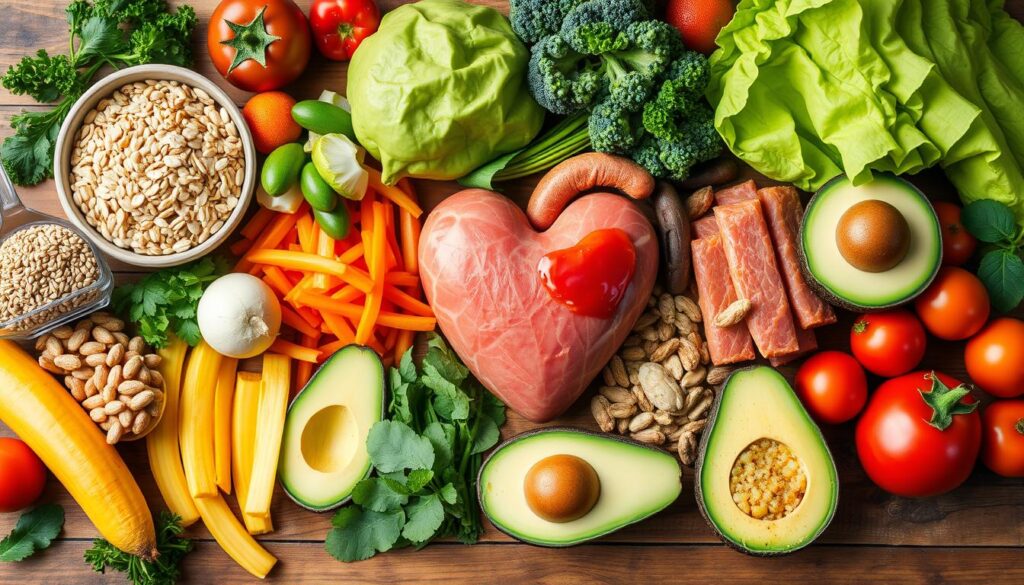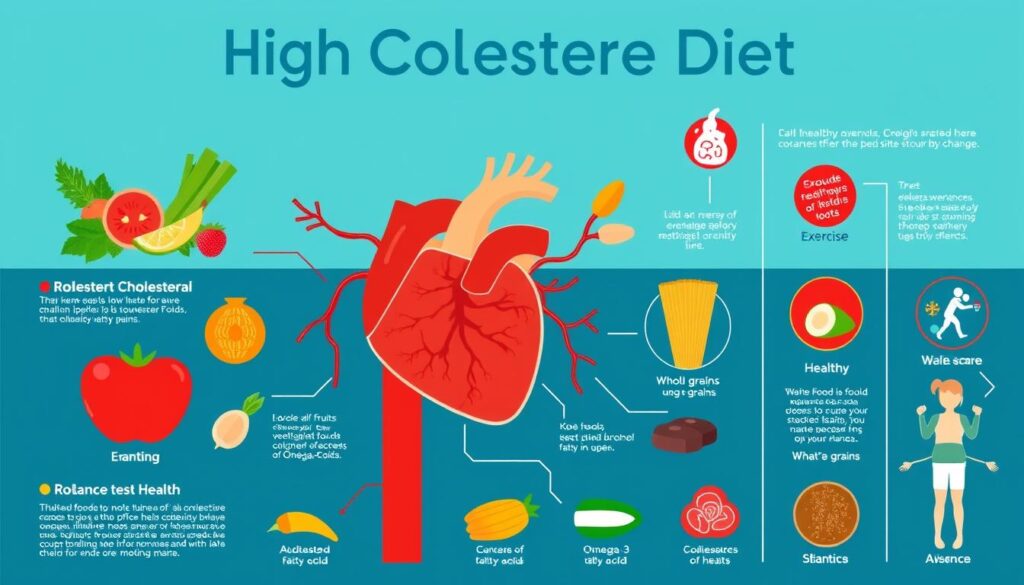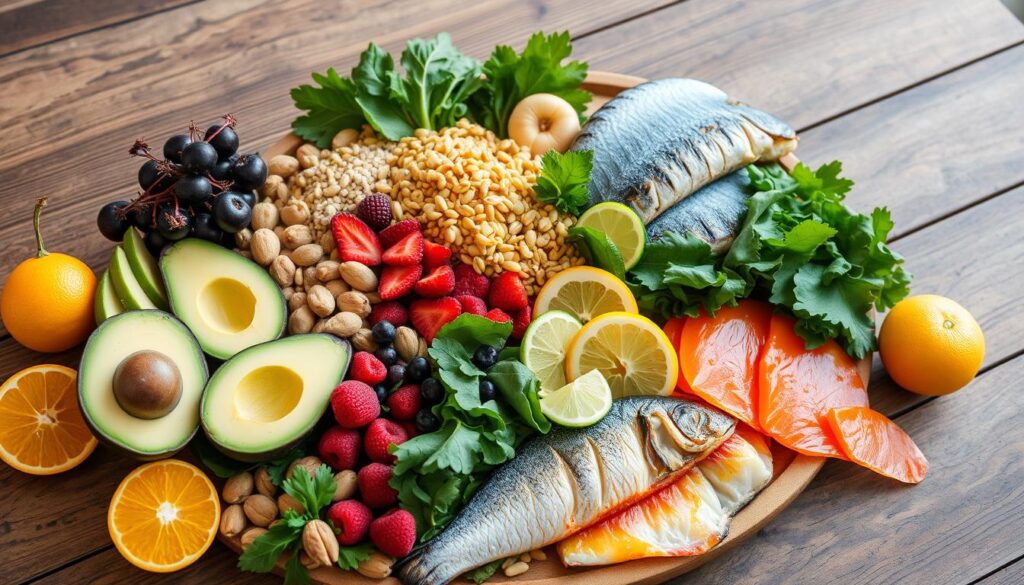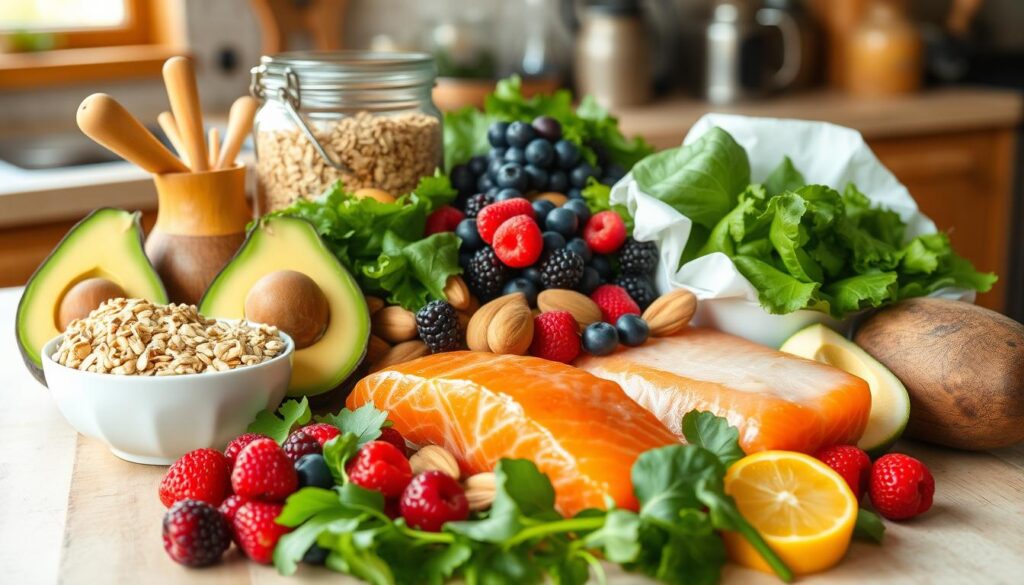
Are you worried about heart health risks in your daily meals? Managing a high cholesterol diet is more than just cutting out foods. It’s about making smart choices that improve your heart health.
Cholesterol-lowering foods are key to avoiding heart problems. Every meal is a chance to protect your heart and lower bad cholesterol. Making smart food choices can greatly improve your health.
This guide shares five important tips for a high cholesterol diet. We’ll look at proven ways to improve your heart health. You’ll get practical advice that goes beyond usual diet advice.
Learn how food affects your cholesterol levels and find foods that lower bad cholesterol. Our expert advice will help you make changes for a healthier heart. Start your journey to better heart health with the right knowledge and food choices.
Understanding Cholesterol and Its Impact on Heart Health
Cholesterol is key to our health, but not all types are good. Knowing about blood lipids helps you care for your heart.

The Difference Between Good and Bad Cholesterol
Cholesterol comes in two main types: LDL (bad) and HDL (good). LDL can clog arteries, raising heart disease risk. HDL, on the other hand, helps clear out bad cholesterol.
- LDL cholesterol: Promotes plaque buildup in arteries
- HDL cholesterol: Helps remove excess cholesterol
- Triglycerides: Another type of fat that impacts heart health
How Diet Affects Cholesterol Levels
What you eat greatly affects your cholesterol levels. Foods high in saturated fats can increase LDL. But, foods with omega-3 fatty acids can boost HDL.
“Your diet is a powerful tool in managing cholesterol levels and protecting heart health.” – American Heart Association
Risk Factors and Warning Signs
| Risk Factor | Impact on Cholesterol |
|---|---|
| Age | Cholesterol levels naturally increase with age |
| Genetics | Family history can predispose individuals to high cholesterol |
| Lifestyle | Sedentary habits can negatively affect lipid profiles |
Spotting warning signs early can stop heart problems. Regular blood tests and knowing your risk factors are key to heart health.
Essential Components of a High Cholesterol Diet
Managing cholesterol needs a smart nutrition plan. A good diet can greatly improve heart health and lower heart disease risks. By choosing the right foods, you can keep cholesterol levels in check.

- Low-fat diet strategies that minimize saturated fat intake
- Plant-based diet alternatives rich in nutrient-dense foods
- Fiber-rich foods that support cholesterol management
Starting a low-fat diet doesn’t mean you have to give up taste or enjoyment. Making smart food choices can change your eating habits. Whole foods, lean proteins, and plant-based options are key to controlling cholesterol.
| Diet Component | Cholesterol Impact | Recommended Intake |
|---|---|---|
| Soluble Fiber | Reduces LDL Cholesterol | 25-30g daily |
| Plant Proteins | Supports Heart Health | 2-3 servings daily |
| Omega-3 Sources | Lowers Triglycerides | 250-500mg daily |
“Food is the most powerful medicine when chosen wisely.” – Dr. Dean Ornish
Changing your diet means understanding nutritional balance. Adding foods high in fiber like legumes, whole grains, and veggies is key. The aim is to make lasting changes that help your heart stay healthy.
Power-Packed Foods That Lower LDL Cholesterol
Finding the right foods for heart health can be tough. But, choosing wisely can really help with cholesterol. Eating the right way is key to keeping LDL cholesterol in check and supporting your heart.

Heart-Healthy Whole Grains and Fiber Sources
Whole grains are full of nutrients that help lower cholesterol. They have soluble fiber that cleans out bad cholesterol. Here are some great whole grains to try:
- Oatmeal
- Quinoa
- Brown rice
- Barley
Omega-3 Rich Foods and Fatty Fish
Omega-3 fatty acids are great for your heart. They cut down on triglycerides and reduce inflammation. Here are some top sources:
- Salmon
- Mackerel
- Sardines
- Chia seeds
- Walnuts
“Food is the most powerful medicine when chosen wisely for heart health.” – Nutritional Expert
Plant-Based Protein Alternatives
Plant-based proteins are good for managing cholesterol. They give you important nutrients without animal fats. Here are some great options:
- Lentils
- Chickpeas
- Tofu
- Tempeh
- Edamame
Adding these foods to your diet can help manage cholesterol naturally.
Foods to Avoid and Smart Substitutions
Managing cholesterol levels starts with knowing which foods harm your heart. Saturated fats and trans fats are big offenders that can quickly raise your dietary cholesterol.
“Your food choices directly influence your cholesterol profile and overall cardiovascular wellness.”
Here are some foods to limit or avoid:
- Processed meats like bacon and sausages
- Fried foods with high trans fat content
- Full-fat dairy products
- Baked goods with hydrogenated oils
- Fatty cuts of red meat
Smart swaps can help manage your cholesterol. Use olive oil, avocado, and nuts instead of saturated fats. Opt for lean proteins like chicken, fish, and plant-based foods to lower dietary cholesterol.
When you shop, always check nutrition labels. Look for products with less trans fats and saturated fats. Choose whole grains, lean proteins, and foods high in soluble fiber for better cholesterol health.
“Small dietary changes can lead to significant improvements in heart health.”
To reduce harmful cholesterol, pick low-fat dairy, grill instead of fry, and eat more plant-based meals.
Conclusion
Managing high cholesterol is more than just diet. Lifestyle changes are key to managing cholesterol well. Eating heart-healthy foods and making smart food choices can greatly improve heart health.
Understanding your body’s needs is the first step to better cholesterol levels. Talking to healthcare experts helps create a nutrition plan just for you. Making small changes in what you eat can make a big difference in your heart health.
Eating a balanced diet with whole grains, lean proteins, and nutrient-rich foods is essential. Adding regular exercise, reducing stress, and choosing foods wisely helps your heart. Remember, lasting lifestyle changes are better than quick fixes.
Your dedication to eating heart-healthy can greatly improve your health over time. While diet changes are powerful, they work best with medical advice and a focus on wellness. Take charge of your cholesterol by making informed, consistent choices for your body’s health.
FAQ
What is considered a high cholesterol diet?
A high cholesterol diet aims to cut down on LDL cholesterol. It boosts heart-healthy foods like whole grains, fruits, and vegetables. It also includes lean proteins and foods full of omega-3 fatty acids.
The goal is to reduce saturated and trans fats. This diet focuses on nutrient-dense foods that help lower cholesterol.
How quickly can dietary changes impact cholesterol levels?
Significant cholesterol level improvements can be seen in 3-6 months with consistent diet changes. Adding regular exercise and lifestyle adjustments can further lower LDL cholesterol. This helps improve heart health.
Are eggs completely off-limits for people with high cholesterol?
Not always. Eggs have dietary cholesterol, but research shows moderate egg eating (1-2 eggs a day) is okay for most. It’s about how you eat them and your overall diet, not cutting them out completely.
What are the most effective cholesterol-lowering foods?
Effective foods include oats, nuts like almonds and walnuts, and fatty fish like salmon. Olive oil, avocados, berries, and whole grains are also key. These foods are full of fiber, omega-3s, and nutrients that lower LDL cholesterol.
Can you lower cholesterol through diet alone?
While diet is crucial, it works best with other lifestyle changes. Exercise, a healthy weight, stress management, and sometimes medication can help. These work together with diet to improve cholesterol levels.
How much fiber do I need to help lower cholesterol?
Aim for 25-30 grams of fiber a day. Soluble fiber is best for lowering LDL cholesterol. Find it in oatmeal, beans, lentils, apples, pears, and veggies like Brussels sprouts and carrots.
Are plant-based diets effective for managing cholesterol?
Yes, plant-based diets are great for cholesterol management. They’re low in saturated fats and high in fiber and nutrients. Studies show they can lower LDL cholesterol and heart disease risk.
